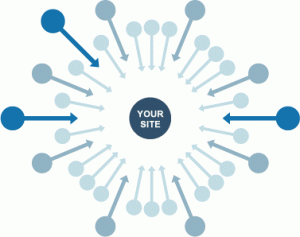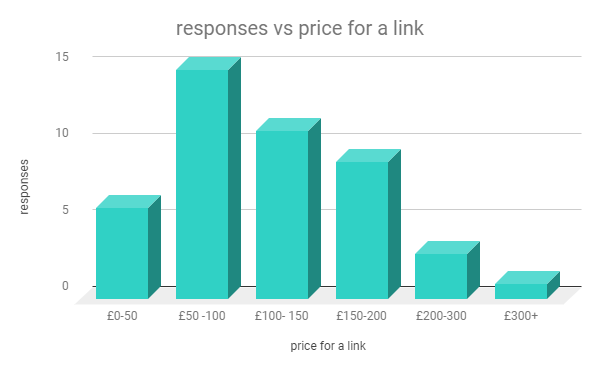So why should you create a guest blogging strategy?
Guest blogging not only builds you as a thought leader within your industry, it also allows you to deliver your message directly to your target audience. And that’s not all…
Position yourself as a thought leader
This is a long-term goal. I can’t lie and say it will happen overnight – because it won’t – but becoming a thought leader should most certainly be on your agenda. By regularly writing and guest blogging about relevant industry news, you can gradually become recognised as an authority in your industry. In time, your audience will begin to come to you for advice.

Build brand awareness
Building brand awareness is one of the core values of all marketing strategies. If you think of a fizzy drink, a chocolate bar, or a trainer, the chances are that particular brands immediately pop into your head.
This is why building brand awareness is so important. Even if you don’t plan on taking over the world, you want customers and prospects to think of you when talking about products or services in your niche. You want to be recognised as a reliable and high-quality brand, so people automatically gravitate to you when they need a particular product or service that you sell.
Alongside this, building a personal brand has never been more important than it is today. Anyone with access to the internet and social media can build an audience, position themselves as an expert, and start attracting clients for their business. That’s exactly what a lot of people are doing, and in a crowded market, you need to stand out. It may be worth creating a guest blogging strategy to help achieve this.
Build links to your site
Link building is the process of gaining hyperlinks from other websites back to your own, and there are two fundamental ways that the search engines use links:
- To discover new web pages
- To help determine how well a page should rank in their results

Once search engines have crawled pages on the web, they can extract the content of those pages and add it to their indexes. In this way, they can decide if they feel a page is of sufficient quality to be ranked well for relevant keywords.
Therefore, if relevant and good quality sites in your industry are linking to you – you’ll end up ranking higher. Here is a list of blog types that earn quality backlinks.
Guest blogging and SEO
Guest blogging and SEO work well together within Google’s guidelines. Publishing useful content on high quality and relevant websites is likely to benefit your search engine ranking position and ultimately bring more traffic to your website. In turn, this will hopefully result in more sales and customers for your business.
Guest blogging should be used as part of a wider strategy for your SEO because it can’t do everything you need, although it will help get you closer to where you want to be.
Only write for trustworthy and relevant sites
Google hates spammy websites, so it is important for a number of reasons that you only blog for good websites.
What is a good website? You can judge a website by its domain rating, design and how user-friendly it is. The website should also be relevant to your topic and business. Avoid associating yourself with poor quality and spammy websites because you could end up being penalised by Google, which certainly isn’t worth it. You shouldn’t want to associate your brand with these types of sites anyway.
Don’t abuse anchor text
This is one of the harder areas to perfect. While anchor text is still a direct ranking factor, it is really important not to take advantage of it by shoe-horning keywords into a blog for the sake of it.
Try to avoid using exact match keywords in your anchor text for every link you get from guest posts. Producing natural and well-written content should still be your priority.
There are plenty of tools, such as Ahrefs and SEMrush, which can help you to get a handle on your anchor text profile. Aim to maintain a balanced anchor text ratio with a combination of branded and commercial links.
The future of guest blogging
But getting relevant links isn’t always straightforward, as anyone in Digital PR will tell you. This recent experience is typical and shows why getting relevant links takes work.
Our team recently pitched some interesting and relevant content to UK home and lifestyle and parenting bloggers: 15 practical home security tips for summer. We discovered and contacted 299 bloggers and webmasters, prioritising 60 of the most relevant blogs to target, which we then reached out to first. We made no mention of a budget but pitched the content for its editorial value.
Out of 106 responses, 92% wanted money for links and content and only 1.8% would use the content, but without a link. It’s also worth noting that we got responses where prices differed: £65 for a ‘no follow’ or £85 for a ‘follow’. The graph below shows how much they were asking for. Some even charged for a ‘no follow’ link.

Not many of the bloggers asked to see the copy before putting a price on its editorial value. For most bloggers, this was a straightforward business transaction. Bloggers are now so aware of the commercial possibilities of working with brands that they’ll seemingly accept any content, so long as it’s reasonably relevant.
What does this mean?
Google brought in ‘no follow’ links to prevent spam, and they’ll penalise a site if they don’t use ‘no follow’ links on unnatural (paid) linking. This is a direct contradiction to what we found with our recent outreach. Bloggers will happily accept money for a ‘follow’ link on their site. Google still considers guest posting as natural – that is, organic – so a ‘follow’ link is fine. What is interesting is the speed at which bloggers are turning link building into a profitable business. It’s a full-time job for many, but it’s important to recognise the difference between advertising and the desire to offer quality content:

What can we do?
Digital marketers and PRs will need to use a much more targeted approach. They’ll need to focus all of their attention on blogs that have a large readership, or are directly relevant to their brand. We need to be more specific about the blogs we want to target, and we need to be more personable than ever.
It’s still useful to check the usual indicators of quality: Page Rank, domain authority, amount of posts per week, average comments per post, and the number of social followers they have. All of these things help determine whether a blog is good enough to target.
It goes without saying that your content must be worth sharing. It must try and evoke an emotional response, and it should always encourage engagement in order to grab the attention of the reader. Make your content the start of a conversation, and make an attempt to reach out to a blogger’s audience.
Your strategy should be to build better relationships, which in turn may build links. You should start a relationship by giving. Give content, give insight, give an opinion, and share your expertise.
So, is guest blogging still worth it?
In short, the answer is yes. There are many benefits of following guest blogging best practises such as brand awareness, building links and improving your website’s domain authority.
Publishing useful content on high quality, relevant websites can benefit your search engine rankings greatly, and ultimately bring more traffic to your site. It will also build your authority in the industry and bring others in your sector to you as a thought leader and expert in your field.
This article has hopefully allowed you to understand the benefits of guest blogging as well as some great guest blogging tips!
Have you just learned something new?
Then join the 80,000 people who read our expert articles every month.


